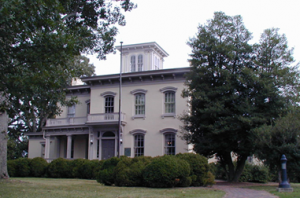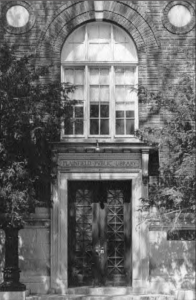We can forget just how gutless Brits can be. That is my genetic and cultural heritage — deference and melancholy. I have a more personal experience with loving libraries.
To the point, about two weeks ago, an acclaimed young English author, Zadie Smith, made an emotional appeal, with intellectual undertones, on BBC 4, calling for maintaining local public libraries even with demands for austerity. I would link to her nearly five minute speech, but the Beeb has been chastened for running it without its usual snarky challenges it makes to interviewees. Instead of its typical iron maiden sort of guest torture, the Today segment let her speak and paid heavy penalties. Rather than say it was her opinion, the Beeb biggies folded and groveled.
You're in luck though in that at least two of the rebutters are online and available even after they removed Smith's originals. I did find her remarks on YouTube though. A puerile poster there accompanies her speech with crude graphics calling her a socialist, "shit writer" and so forth. If you want to keep a little objectivity, you can minimize the window during audio play. If you're hardcore right wing, you can hear like-minded critics of her position here and here. Moreover, the English press was all over her and the Beeb for calling for continued public funding for public libraries; more such links are here.
The Brits seem to have stopped demands for rights with Magna Carta and really don't relate much to our whole First Amendment/free speech thingummy. Also unlike U.S. libraries with citywide funding in most cases, most English public libraries are under controls of local councils, nearly autonomous hyperlocal groups that seem to operate like U.S. home owners associations, with all the power and none of the wit of big-picture people.
Likewise, most American seem content to fund public libraries and accept that local access to books and other educational resources is necessary, wise, and, well, American. In contrast, conservative Brits who have spoken up take the position that as fewer go to libraries regularly, that means these deserve less or no funding. Also, they say familiar winger stuff like saying, "If I don't use this service, my tax-funded government should not pay for libraries."
For the moment, set aside the arguments about schools, highways, rail, and mass transit. Do you think it is unfair that services for the commonweal require funding from those who at a given time in their lives or locations may not use all the service? Those who understand the basics of democracies and nations should, but not all do.
Libraries I've Known
Maybe because I've been around awhile or perhaps because I grew up in homes with many hundreds of books, I believe in libraries. As we always got many magazines and several daily papers, my family in my childhood through adulthood read at home, in school and in libraries. I always had at least two sets of encyclopedias available, along with big atlases, unabridged dictionaries, almanacs, and many other reference books. From an early age I was sure to hear the same response whenever I asked by widely and deeply knowledgeable mother something — "Look it up!"Sometimes, we didn't have the books with the right answers in house. From an early age, I trotted to the library. School libraries were pretty limited, so it was to the public ones.
 I was eight when I truly got into libraries as lifestyle. In Danville, Virginia, the public library was in a mansion built by a Civil War era officer and tobacco magnate, Maj. William T. Sutherlin. His home became the last capital of the Confederacy where the decision to surrender occurred. I was vaguely aware of the history, but much more attuned to the huge number of books.
I was eight when I truly got into libraries as lifestyle. In Danville, Virginia, the public library was in a mansion built by a Civil War era officer and tobacco magnate, Maj. William T. Sutherlin. His home became the last capital of the Confederacy where the decision to surrender occurred. I was vaguely aware of the history, but much more attuned to the huge number of books.It surely was a grand home and it was a wonderful library. The kids' and young adults' books were in the basement, which was cheerful with numerous windows up high.
There I discovered and devoured whole ranges of books we did not have at home. I remember reading everything that was in whole or part of Norse mythology and of dinosaurs. Apparently too I read virtually everything, checking out the maximum (eight at a time as I remember it). The chief youth librarian there pulled me aside and presented me with an adult card after I had gone through her goods. That let me upstairs into an even wider world. I kept at it until we moved when I was just short of 13. Bless her.
We lived for a couple of years next in the middle of Virginia, Chester. It had a pathetic library. I read everything we had at home, turned to randomly going through encyclopedia articles and our many history books, and spent more time and money visiting bookstores in nearby Richmond and in Washington when we saw relatives near there.
 Then the summer of my 15th birthday, we moved to Plainfield, New Jersey. It had a 1912 Carnegie library, one of many the steel magnate funded for the betterment of the common folk. Bless him too.
Then the summer of my 15th birthday, we moved to Plainfield, New Jersey. It had a 1912 Carnegie library, one of many the steel magnate funded for the betterment of the common folk. Bless him too.While the city had good book stores, as well as cheap and easy bus access to Manhattan where I visited constantly, the library was both a community center and educational resource. While it was replaced with a bigger, glassed, community-hospital looking place a few years after I graduated high school, my friends and I haunted and loved this one.
It abutted the big public park with the high school. We ate, debated, sang, necked and studied in the park and did everything short of eating and drinking in the library. My friends were often astonished at the number and variety of books in my apartment and for those without such absurd amounts of reference material, the library was key to decent grades and being able to converse with your chums.
There must have been classmates who didn't read. I honestly don't recall any. After all, this was also the Sputnik/space-race era. We were getting pushed from the President to teachers to parents to get smart, get smarter, and take America to the stars. Ta da.
[Of course, there were neither personal computers nor even the earliest forms of the internet (not even ARPAnet, bulletin boards, nor telnet command-line connections before browsers existed). Seeing that, kiddies should probably look up archie and particularly gopher. Information was available online before the World Wide Web GUIs, but you actually had to know how to get to it.]
View Across the Pond
For all reactionary craziness and vitriol toward Smith and secondarily the BBC, I didn't really dig into this until the Financial Times' Christopher Caldwell waved his right-of-center wand over the proceedings. In today's FT, his column attempts a Newtonian objective distance for observation.He agrees that Smith clearly and accurately sees libraries as cultural levelers, gateways for those who take advantage of them. Yet he criticizes her for not understanding the economics and politics behind the 400-plus libraries at risk of closure there. He writes that the snooty upper class sorts are not the problem here, rather that libraries "are imperiled for different reason: because (local councils) have better things to do with the money."
He finds the grand public libraries both there and here as atavistic, belonging to "a brief transitional period at the end of the 19th century — after the rise of democracy but before the rise of the welfare state." He adds that in such tight times as now, governments decide what's really necessary.
In that, he mentions an article by Eleanor Jo Rodger in American Libraries. He really doesn't get too deeply into that, but I suggest reading it. Her primary theme is librarians need to define which of their services are necessities and which are amenities. From there, they can make the case and get steady supporters for the essentials they deliver.
Caldwell is certainly not anti-library. He does brush aside advocates' personal and emotional calls. Instead, he cites the goals of the founders of the library systems as seeing "that a certain amount of intellectual infrastructure is necessary to the maintenance of a free society." They aren't to produce erudite gentlefolk, rather to help provide the public with "a basic toolkit of literary communication that leaves them uncowed by accounts built out of words, sentences and paragraphs."
He concludes that the political reality is that defending such amenities as DVD checkouts and internet access "may work better than defending necessities."
I suspect pitching necessities as well will be necessary. There are plenty of Americans, even more than usual in hard times, who are eager to forgo egalitarianism. The have-nots don't get a lot of support in rough times, and little enough in good ones. Simply appealing to the American ideals of giving everyone a chance at the dream is seldom effective.
I am a book guy, one who has spent and still spends far more than my share of time in libraries. I am not a homeless fellow using a library to stay safe and warm. I'm not someone who needs to be there to access a computer and the internet. I'm not a teen who gets homework help there. Yet each of our groups and others uses and benefits from our branch libraries. That seems as American as it gets.
Cross-post, yet again: As this is both political and personal, I also put it on Harrumph.
Tags: massmarrier, Zadie Smith, libraries, FT, Caldwell, funding, Plainfield, Danville
No comments:
Post a Comment